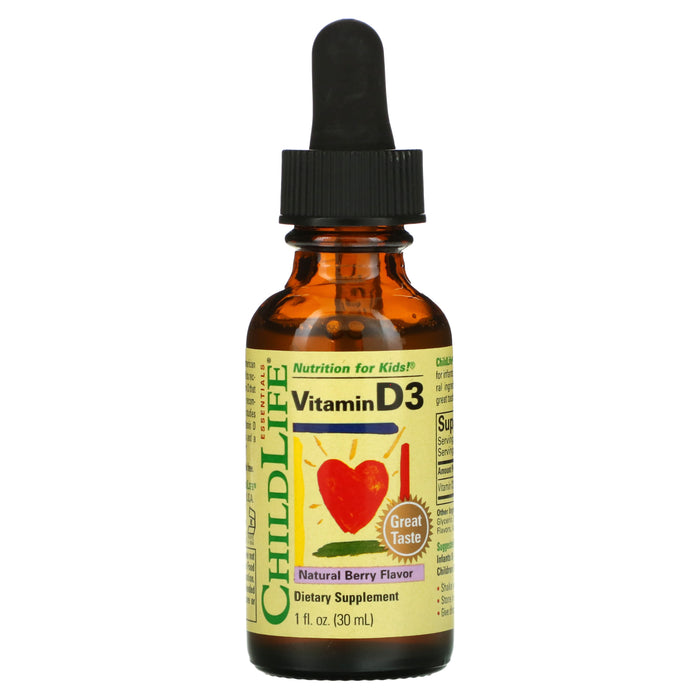




| Serving Size: 8 drops | ||
| Servings Per Container: 115 | ||
| Amount Per Serving | % Daily Value | |
| Vitamin D3 (as Cholecalciferol) |
500 IU |
125% |
Maintain optimal vitamin D levels with ChildLife Vitamin D3, Natural Berry flavored drops for children.
ChildLife Vitamin D3 is a dietary supplement designed specifically for infants and children, providing vitamin D3 in a great-tasting, natural berry flavor. This alcohol-free, gluten-free, and casein-free formula is made with natural ingredients for optimum absorption and is Kosher Parve.
Infants 0 - 12 mos: 6 drops daily
Children 1+ yrs: 8 drops daily
Shake well before use.
Give directly or mix in your child's favorite drink.
Organic vegetable glycerin, deionized water, natural berry flavor, vitamin E (antioxidant).
Store in a cool dry place.
At Health Orchard, we are committed to providing accurate product information and images. However, manufacturers may update their product packaging or ingredients, and these changes may not be immediately reflected on our website. It's possible for products to be shipped with different packaging than what is shown online. For the most accurate and safe use of any product, we advise reading the product's label, warnings, and instructions rather than relying solely on the details provided by Health Orchard.
The best supplements for prostate health may include saw palmetto, beta-sitosterol, and pygeum, which have shown potential in supporting prostate function and reducing symptoms of benign prostatic hyperplasia. Additionally, lycopene, zinc, and selenium are often recommended for their antioxidant properties and potential benefits for prostate health.
The best prostate supplement varies depending on individual needs, but top-rated options often contain a combination of saw palmetto, beta-sitosterol, and other prostate-supporting ingredients. Look for supplements that have been third-party tested for quality and purity, and consider factors such as dosage, ingredient sourcing, and clinical evidence when choosing a product.
Doctor's Best prostate formula typically contains a blend of ingredients such as saw palmetto extract, beta-sitosterol, pygeum africanum bark extract, and pumpkin seed oil. It may also include additional supportive nutrients like zinc, selenium, and lycopene, all chosen for their potential benefits in promoting prostate health.
Side effects of prostate supplements can vary but may include mild digestive issues, headaches, or dizziness in some individuals. Some supplements may interact with medications or affect hormone levels, so it's important to be aware of potential interactions and monitor for any unusual symptoms when starting a new supplement regimen.
While no single drink can definitively lower PSA levels, some beverages that may support prostate health include green tea, pomegranate juice, and tomato juice. These drinks contain antioxidants and compounds that have shown potential benefits for prostate health in some studies, but they should not be considered a substitute for medical treatment.
The safest prostate treatment depends on the specific condition and individual health factors, but generally, lifestyle modifications such as diet changes and exercise are considered safe initial approaches. For medical treatments, options like watchful waiting, active surveillance, or minimally invasive procedures may be recommended depending on the severity and progression of the prostate issue.